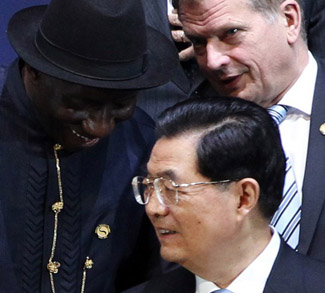Summary
According to a 2011 survey from the Pew Research Centre, 76 percent of Nigerians have a generally positive view of China. And with Beijing providing moral and material assistance at a level most Western countries can’t compete with, it’s not too difficult to see why. Yet relations between these two countries may not always go so smoothly, for theirs is a trade dynamic full of structural challenges.
Analysis
At the risk of turning away from the shrill tone that has become par for the course of late in analyzing China’s ‘selfish’ policies towards Africa, it must be said that the trade relationship that exists between China and Nigeria is mutually beneficial in several key ways. First and foremost, the trade flows in question are substantial. Total trade volume stands at over $18 bn USD, and in terms of investment, Nigeria is China’s second-largest FDI destination on the continent after South Africa. Much of this investment goes into large-scale infrastructure projects that have the dual benefit of increasing Nigeria’s economic competitiveness and ensuring Chinese access to Nigerian resources, largely in the form of oil and gas. Thus, the list of Chinese corporations operating in Nigeria contains no surprises: Sinopec (energy), CNPC (energy), SEPCO (energy), CCECC (construction), CSEC (construction), CNOON (offshore energy), and the list goes on. There are also a handful of Chinese telecom companies vying for a piece of Nigeria’s lucrative and growing mobile phone market. Notably, there has also been a lack of large scale purchases of agricultural land, or ‘land grabs’ that have been occurring in some other African countries. Chinese companies have also displayed a sensitive attitude towards local labor at times through the adoption of relatively large local managerial quotas in co-managed special economic zones.
Thus, the first piece of the puzzle of China’s golden approval ratings in Nigeria is their ballooning trade relationship. The second piece refers to the infrastructure projects that China can take on in Nigeria. Whether the Chinese company in question is private or state-owned, they all have access to cheap and plentiful credit through China’s state-owned banks. This allows Chinese companies to outbid foreign competitors who are beholden to more risk-averse private creditors. The end result: roads, rail, air, and port links, all financed by the Chinese government.
And finally there’s Beijing’s much-discussed ‘no strings attached’ approach to foreign aid. This also contributes to an overall positive impression of China among Nigerian citizens, and it merits a mention as to why. The impression often disseminated in the Western media, that of a strings-or-no-strings aid debate centered on questions of democracy and political accountability, is deeply flawed. It misses the crucial fact that many Africans view these strings in the context of draconian structural adjustment policies during the 80s and 90s. In other words, many people still remember the strings attached by Western institutions that dragged many an African nation into economic ruin. Thus, when African populations respond positively to China’s offers of unqualified aid, it’s just as much because the aid is devoid of economic ideology as it is a question of politics.
Ironically, this very same South-South harmony contains a seed of economic malaise for Nigeria. In terms of domestic economic development, both countries want the same things, though one of them is far bigger than the other. The sunny number of a total trade volume amounting to $18 bn hides the fact that 87.3 percent of it is Chinese imports. The little amount that Nigeria sends back to China is overwhelmingly constituted by oil and gas products. Indeed, deepening trade links with China may have come at the serious cost of jeopardizing Nigeria’s ability to industrialize. Such is the message being trumpeted by Nigerian trade unions, who claim that their country has lost 350,000 domestic manufacturing jobs to cheap Chinese imports; a number that pales in comparison to the 30,000 some odd Nigerian workers who are presently employed by Chinese companies. Even more troubling is the legislative impotence displayed in dealing with the problem. Every anti-dumping law that the Nigerian government passes is quickly compensated for through an increase in illegal smuggling from the four countries that border Nigeria.
These economic contradictions will serve to temper enthusiasm for an over-reliance on China. Even if Beijing wants to turn Lagos into a beachhead for Chinese products in Africa, Nigeria needs to transition from a resource-based to a manufacturing economy if it ever wants to make good on the boon of its oil wealth. How can it possibly do so when every rung of the development ladder, from textiles to running shoes, are all firmly made in China?




